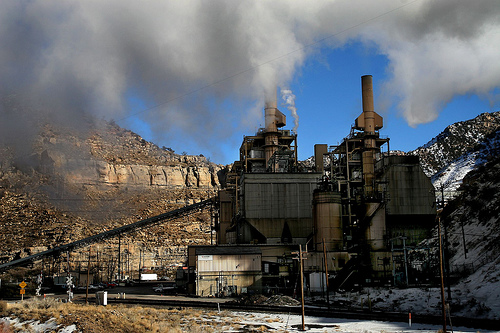Carbon capture and sequestration (CCS) — the “clean” in “clean coal” — will never play a significant role in any future that puts a market price on carbon pollution.
Yes, we have to reduce CO2 emissions, and yes, we’ll have to pursue every plausible path to that goal. It’s just that there are no plausible futures where CCS is economically viable.
CCS proponents will argue that (a) it may be expensive now, but with R&D its price will come down and (b) since coal plays such a significant role in our electric system today, coal with CCS simply must play a role in the electric system of the future. Neither assertion stands up to economic scrutiny.
R&D cannot reduce the cost of CCS to sufficient levels
Any early stage technology has the potential for cost reduction, but that doesn’t mean that jet cars will someday be cheaper than skateboards. There are fundamental limits. The limits innate to CCS will prevent it from ever being cost-effective with other CO2-free generation technologies; this is true for both capital and operating costs.
First, consider technologies that have seen dramatic reductions in capital cost. From computer chips to jet engines, they have all demonstrated some combination of the following:
- High production volumes
- Product standardization
- Niche entry markets where they could gain experience and come down the cost curve.
Computer chips demonstrate all three of these features. Gas turbines and solar panels have at least the latter two (aircraft engines and off-grid applications serving as an entry market). CCS has none.
There is no market for CCS except in large, grid-connected, utility-scale applications. Given the scale of the plants and unique technical characteristics of each site, there is no meaningful opportunity for standardization or mass production. It follows that the only way to build markets for CCS projects is by sustaining public appetite for high cost electricity and/or sustaining investor appetite for lousy returns. Even nuclear power hasn’t been able to sustain that degree of taxpayer and investor patience — and it at least has had the benefit of naval applications to gain manufacturing experience.
Further, CCS is subject to innately long technology maturation times. It takes years to design, permit, and obtain financing for utility investments at this scale — and years after that for construction and commissioning. There is a close analogy to evolution (which Matt Ridley frames nicely as “ideas having sex”): the shorter the time period between manufacture and product obsolescence, the faster technologies tend to evolve. CCS is not prone to technological promiscuity.
But capital costs only tell half the story. CCS is unique amongst all low/zero carbon power generation technologies in that it is handicapped by high capital costs and high operating costs. Nuclear and solar are expensive to build but cheap to run. Gas-fired generation is cheap to build but expensive to run. CCS blows it both ways, because of all the additional fuel (and capital) required to separate, purify, compress, and store CO2. It will take dramatic cost reductions on both fronts for CCS to be viable.
Coal’s role today implies nothing about CCS’ role tomorrow
The operating cost issue is ultimately the bigger of the two problems. Coal plays a role in today’s power grid because on the margin it is cheaper than most alternatives. However, coal with CCS has innately higher marginal costs than coal without CCS. Meanwhile, every other CO2-free power generation technology has lower marginal costs than coal without CCS.
In other words, coal’s economic advantage disappears in world that prices CO2, even if it includes CCS. Even if we built a fleet of CCS coal plants, we wouldn’t run them. We might as well dig a hole to bury all our money — it would have an identical impact on the electric grid, economy, and environment.
How to turn a theoretical boondoggle into a real one
In fairness, there is one way CCS could succeed: legislators could exempt it from any market discipline and force utilities to operate the assets in spite of their lousy economics. Market-distorting subsidization is the core competence of U.S. energy policymakers, so this outcome is certainly possible.
But if it’s the only way CCS makes any sense, why bother?



